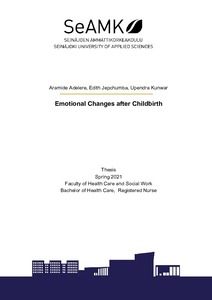Emotional changes after childbirth
Adelere, Aramide; Jepchumba, Edith; Kunwar, Upendra (2021)
Adelere, Aramide
Jepchumba, Edith
Kunwar, Upendra
2021
All rights reserved. This publication is copyrighted. You may download, display and print it for Your own personal use. Commercial use is prohibited.
Julkaisun pysyvä osoite on
https://urn.fi/URN:NBN:fi:amk-2021090117288
https://urn.fi/URN:NBN:fi:amk-2021090117288
Tiivistelmä
Pregnancy and childbirth are a very special time in a woman’s life. A lot of changes occur during postpartum period, that most mothers are not aware of, such as hormonal changes, physical changes, social changes, biological changes, and emotional changes. The goal of this thesis is to provide research-based information for mothers who are going through emotional changes during postpartum period. The purpose of this thesis is to answer the question relating to self-management of emotional changes after delivery. The information gathered from different research articles can be used as a guide at Seinäjoki maternity clinics for mothers who speak English.
The data collection method and analysis were achieved by reviewing literature and inductive analysis of the searched material. A systematic search of the literature was carried out and the following databases were used: CINAHL, Seamk Finna, Pubmed/Medline, as well as other sources like Google scholars, E-books and WHO website with full text and substantial information. Different key words were used for the research: pregnancy, childbirth, baby blues, Electroconvulsive (ECT), Cognitive behavior therapy (CBT), postpartum depression, physical changes, social changes, and emotional changes. The data analysis method used is inductive content analysis. The main category of our data analysis is self-management of emotional changes after childbirth. In our findings, we identified skills that mothers need to self-manage their emotions during the postpartum period before leading to postpartum depression, which are: emotional skills, social skills, and social support.
The results of our study indicate that healthcare professionals should collaborate with the mothers so that they can recognize the signs and symptoms of emotional changes in mothers. and prevent, diagnose, and treat the mothers before it leads to postpartum depression. In addition, fathers’ emotional challenges and how they can cope with it should be researched.
The data collection method and analysis were achieved by reviewing literature and inductive analysis of the searched material. A systematic search of the literature was carried out and the following databases were used: CINAHL, Seamk Finna, Pubmed/Medline, as well as other sources like Google scholars, E-books and WHO website with full text and substantial information. Different key words were used for the research: pregnancy, childbirth, baby blues, Electroconvulsive (ECT), Cognitive behavior therapy (CBT), postpartum depression, physical changes, social changes, and emotional changes. The data analysis method used is inductive content analysis. The main category of our data analysis is self-management of emotional changes after childbirth. In our findings, we identified skills that mothers need to self-manage their emotions during the postpartum period before leading to postpartum depression, which are: emotional skills, social skills, and social support.
The results of our study indicate that healthcare professionals should collaborate with the mothers so that they can recognize the signs and symptoms of emotional changes in mothers. and prevent, diagnose, and treat the mothers before it leads to postpartum depression. In addition, fathers’ emotional challenges and how they can cope with it should be researched.
